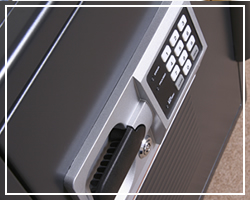Subject 8. Insurance, Records and Planning
Farm Security
Records
|
Good recordkeeping is essential to a well-run business. But these important documents are vulnerable to theft or destruction, if not properly secured. Access to your records should be restricted to authorized personnel. Sensitive information such as personnel files, payroll, bank account numbers and finances should be stored in locked, fireproof files in a secured area and shredded when no longer needed. Other sensitive records, such as animal identifications and inventories (feed, fuel, fertilizer, pesticides, supplies and equipment), should also be kept up-to-date and secure. Computerized (digital) records are susceptible to loss, too. It seems that every week a new computer virus is crashing computers across the country, destroying valuable documents. Cyberterrorists can destroy years of data in minutes: financial and crop production records, lease contracts, and government program information. There are simple, inexpensive ways to backup your records as a safeguard against loss. For example, you can routinely back up critical files to an external hard drive, CD or jump drive. You can use cloud-based storage. Several sites provide automatic back up and secure storage service. Work with your computer service provider to be sure your computer has adequate protection. Back up your files at least once a week or more often if you regularly add information. No exceptions. Keep copies and computer back-ups of critical information and important records in a location away from your home or office. Maintain them diligently so that they are always up-to-date. Cyber Security Control all access to your farm computers to protect confidential information such as farm history and financial records. Install anti-virus software and regularly update it, and change your password often. Install software (generally termed a “fire wall”) to protect against computer hackers.
|

